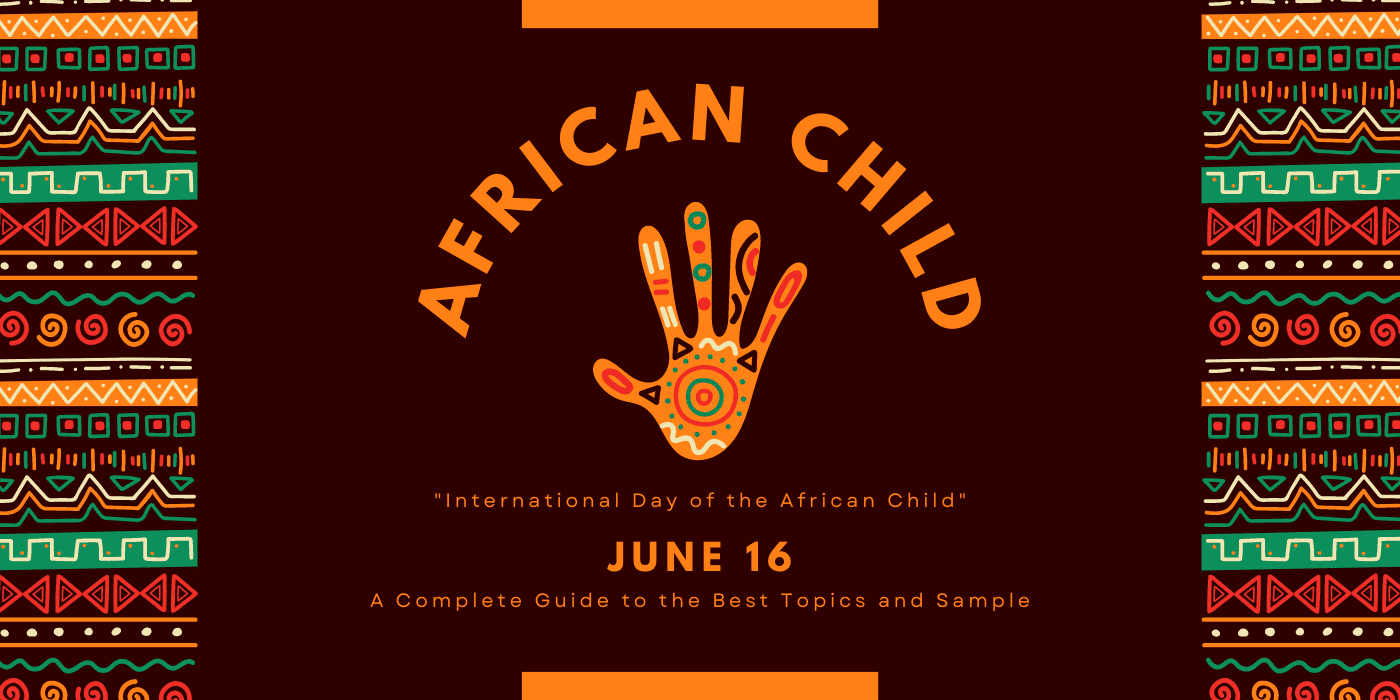Engaging International Day of the African Child Speech Topics
Informative, Persuasive, Impromptu, and Fun Choices for Your Next Presentation

International Day of the African Child is an annual observance that garners attention worldwide. The primary focus of this special occasion is to bring awareness to the ongoing need for improvement of the education provided to African children. Having originated from the 1976 uprising in Soweto, South Africa, where children protested for their right to quality education and an improved learning environment, this day is now recognized on June 16th by nations globally. Several activities, such as parades, art exhibitions, and conferences, take place to commemorate this day. In this vein, we're presenting an array of International Day of the African Child speech topics to enlighten, persuade, entertain, or challenge your audience.
Informative Topics

Informative Speech Topics: Illuminating the African Child's Experience
- Historical Origins of International Day of the African Child
- The importance of improving educational standards for African children
- Challenges faced by African children in obtaining a quality education
- The Significance of cultural diversity in African child education
- Understanding the 1976 Soweto uprising
- The Role of international organizations in Promoting African child welfare
- Child Labor and its impact on African Children
- Child Soldiers in Africa: A stark reality
- The state of healthcare for African children
- The Role of Education in Breaking the Cycle of Poverty in Africa
- The Status of Girls' Education in Africa
- Promoting peace through education in war-torn African regions
- The Effect of HIV/AIDS on African Children
- The Significance of early childhood education in Africa
- The Plight of orphaned children in Africa
- The Impact of climate change on African Children
- The African Union’s role in promoting children’s rights
- The Role of African folk tales in child education
- Understanding the child rights policy framework in Africa
- Migration and displacement: The ordeal of African child refugees
Persuasive Topics

Persuasive International Day of the African Child Speech Topics: Advocate for the African Child
- Why education for all African children is crucial to global progress
- The necessity for increased international aid for African education
- The urgency to combat child labor in Africa
- The Need for gender equality in African child education
- The importance of making quality healthcare accessible to every African child
- Why investing in African early childhood education is essential
- The imperative to protect children in conflict zones in Africa
- The urgency to support HIV/AIDS orphaned children in Africa
- Why addressing climate change is crucial for the future of African children
- The Importance of Maintaining African cultural heritage in child education
- The need to end the recruitment of child soldiers in Africa
- The imperative of a peaceful environment for children’s education in Africa
- Why Africa Needs a stronger child rights policy framework
- The importance of acknowledging and celebrating International Day of the African Child
- Why support for orphaned and displaced children in Africa is crucial
- The urgency of addressing child malnutrition in Africa
- Why the international community must support the African Union in promoting children’s rights
- The need for implementing sustainable solutions to tackle poverty in Africa
- The importance of empowering the African girl child
- The need to build resilient educational systems in Africa
Impromptu Topics

Impromptu Topics: Speak from the Heart about the African Child
- My experience participating in International Day of the African Child
- How learning about the Soweto uprising impacted me
- Why everyone should know about International Day of the African Child
- My views on the state of education in Africa
- Why I believe in the power of education for African children
- A story about an inspiring African child I know
- My Perspective on child labor in Africa
- How I think the world can help improve healthcare for African children
- My feelings on the situation of girls' education in Africa
- Why I think early childhood education is Critical in Africa
- My Thoughts on the child rights policy framework in Africa
- My views on the role of the African Union in child welfare
- A personal narrative about a Displaced African Child
- Why I believe we need to fight climate change for African Children
- A story about how African folklore impacted a child’s life
- Why I think education Can bring peace in African conflict zones
- How I feel about the situation of orphaned children in Africa
- My reflections on the effects of HIV/AIDS on African children
- An inspiring success story of an educated African child
- My thoughts on how we can better celebrate International Day of the African Child
Fun Topics

Fun Speech Topics: Light-hearted Takes on the International Day of the African Child
- Imagining a day in the life of an African schoolchild
- Fun ways to celebrate International Day of the African Child
- The most surprising facts about the Soweto uprising
- The joy of learning through African folklore
- The Coolest African child prodigies and their stories
- How children in Africa play and learn
- An imaginary interview with an African child superhero
- The most exciting African child sports stars
- An adventurous journey of an African Child in a Story
- The funniest moments in African Children's Literature
Sample Speech Selected from the International Day of the African Child Speech Topics
Let's illustrate using an informative topic: "Understanding the 1976 Soweto uprising." You can start your speech with a brief introduction about the Soweto uprising, followed by its causes. The main body of the speech can include details about the event, highlighting the role of children. It's also essential to cover the impact and significance of the uprising. Lastly, connect this historic event with the International Day of the African Child and conclude by emphasizing the importance of remembering such historical events.
"Understanding the 1976 Soweto Uprising"
Dear friends,
Imagine a time when students like us would be forced to study in a language that was not our own, representing oppression and injustice. This was the reality faced by the brave children of Soweto, South Africa, in 1976. Today, we will journey back in time to understand the events that sparked the Soweto Uprising and why it's crucial for us to remember them on the International Day of the African Child.
On the chilly morning of June 16th, 1976, students, some even younger than us, in the township of Soweto stood united against a new policy. This policy mandated using Afrikaans, the language of those oppressing them, as the medium of instruction in black schools. But this uprising wasn't just about the language of learning. It was a fierce battle against an unfair education system designed to keep them subservient.
Can you imagine the courage it must have taken to protest against such unfairness? These were ordinary kids like you and me, yet their brave hearts led to an extraordinary protest. Unfortunately, this peaceful demonstration was met with brutal force. The horrific event caused global shockwaves, illuminating the injustices endured by the black majority under apartheid.
These young heroes' spirits and determination resonated far beyond Soweto. Their stand against an oppressive system woke the world to the horrors of apartheid, resulting in global condemnation. This pivotal historical moment was a game-changer for South Africa's anti-apartheid struggle.
Why should we, as students in the 21st century, remember this? The answer lies in the day we observe: The International Day of the African Child. Every year, on June 16th, we honor the brave young souls of Soweto who refused to be silenced. We also reflect on the challenges African children still face today, reminding us that the fight for equal rights and opportunities is far from over.
In closing, the story of the Soweto Uprising is more than a chapter in a history book. It's a tale of courage, resilience, and the power of youth. It teaches us that, just like those students of Soweto, we have a voice, and we can use it to stand up for what we believe in. As we commemorate the International Day of the African Child, let's carry their spirit in our hearts. Let's learn from their courage and be inspired to raise our voices against any injustice we see around us.
Thank you.
We hope these International Day of the African Child speech topics spark your creativity and inspire you to deliver a heartfelt speech that resonates with your audience. As you prepare, remember that your voice is a powerful tool to enlighten and inspire change in the world.
- Home
- Special Occasion
- International Day of the African Child Speech Topics



